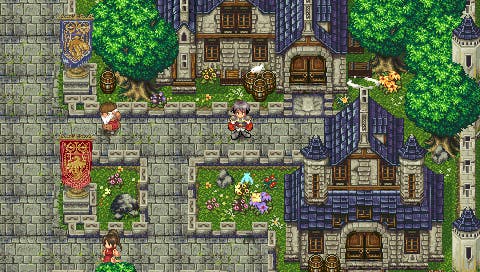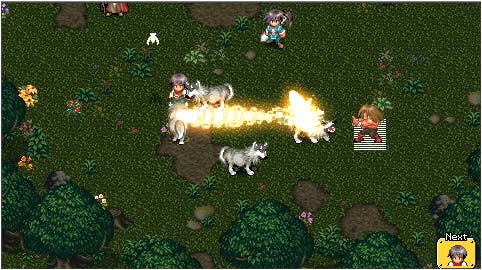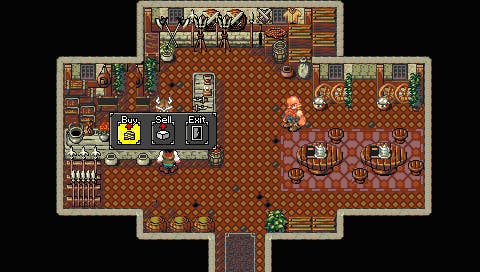Astonishia Story
Not sure about the translation, says Young Lady of Full of Troubles.
"A simple and easy to understand scenario and system will get people of all ages and both sexes to enjoy playing casual RPG games."
There's so much between those lines it's a marvel they managed to squeeze it into the PSP's 480x272 start-up screen.
The key words in there, both literal and inferred, describing this game and to whom it should appeal are: "simple", "easy", "casual", "the elderly" and "girls". Not things one traditionally associates with any type of videogame, let alone orthodox 12-year-old Korean-pretending-to-be-Japanese RPGs.
Right. Before we cover our adjectives in Astonishia's blood lets make a few things clear. Simplicity and ease of understanding are good and rare things in videogames. Titles that appeal to both ages and are inclusive of all sexes are similarly commendable; but the key to both these things isn't in dumbing down - it's in clear, concise form and function.
It's in game mechanics that are understood in a moment but savoured and unravelled through a lifetime; it's in making straight and fast and easy in-roads to fun and payoff for a player so that the eyes of those unwilling to contend with the ugly and lazy gaming conventions that hardened players happily excuse, sparkle with understating and fresh delight.
It's Tetris; it's Super Monkey Ball, EyeToy, LocoRoco, Dance Dance Revolution. It's Advance Wars; that Nintendo difference. It's also known as being good at your job.

And that is what's so infuriating about Astonishia Story's little preplay caveat: it's pure spin. It's parading stupidity for simplicity; claiming superficiality as elegance; passing off the base and obvious as premeditated inclusiveness and marketing what was bland, ineffective and derivative in 1994 as colourful, interesting and novel in 2006.
OK; that's probably enough spittle-flecked preaching for one introduction. Some instruction manual points to put the youngsters in the cheap seats as ease:
Astonishia Story is a traditional JRPG first released in Korea in 1994. Neither of those latter points automatically count against. Plenty of decent RPG efforts have come out of Korea and 1994 was the year in which Final Fantasy VI was released which, as we'll tell you in six months time when it gets its GBA release, wee-wees all over most RPGs released today in style, content and invention.
However, this game is a most basic expression of the genre - there are towns, villages, caves, dungeons, monsters and NPCs to talk to and help out in the usual way. Items need collecting; incrementally better armour and weapons need equipping and secret passages are there for the discovering as you trace protagonist Lloyd the knight's story as he seeks to recover a stolen sacred staff en route to the decisive encounter with an evil Elvin queen.

Virtually the only distinction the game makes for itself from this staple detail is in its battles: a simplified strategy RPG grid based approach as seen in Shining Force, Fire Emblem and Disgaea et al. Of course, mentioning these greats in the same breath as Astonishia is to damn them through association for this is strategy at its most base. Enemies simply rush you displaying no discernable intelligence and there is no depth from using environments to your advantage or manoeuvring your characters around enemies to attack their undefended backs - all basic ingredients of any SRPG mechanic.
As with recent PSP conversion Breath of Fire 3, there are extreme problems with loading as well. As a port of a GP32 port of a DOS game this game has been through the coding mill and the load times before each and every battle animation are completely inexcusable, even if the more forgiving and uncritical player might take them in their stride.
The game also maintains a tough level of difficulty over its lifespan. As levelling up is slow throughout the game this leads to longer and longer fights for smaller and smaller rewards - something that can be fun and exciting in a title like Disgaea as you toy and explore the strategy and maths, but which is straightforward dull, wearing and hurtful grinding here.
This problem is compounded by the apparent lack of effect accessories, armour and weapons have on your player's statistics - placing all the emphasis for character progression on levelling. The balance of actual statistics is - and sorry to bore you with this - all out of kilter: your characters often will unlock skills that vastly exceed their current MP level rendering them useless. Likewise the allocation of experience favours the stronger party members (those that deal the most damage) - a broken system that causes the strong to get stronger and the weak to remain weak.

So just the kind of thing that will appeal to all ages and sexes right?
Still, as companies like Working Designs have shown in the past, games that are messy under the surface can still be polished up to sound fun with the right translation team right? Here Ubisoft America has disgraced itself with comfortably the shoddiest translation we've ever seen in a modern videogame. At times it feels as if the first draft of a translation from Babelfish has been inserted into the game. NPCs boast names such as names like "Man2" and "Young Lady of Full of Troubles" - something that might be a little funny if it were through choice rather than omission. The story is also completely unfathomable, the dialogue is mostly impenetrable, and the occasional glimpse of partially translated non-sequitur humour is always either unintentional or unexpected through irregularity.
All of which makes for rather miserable reading and reviewing. This is a sweet game in many ways, despite the brokenness beneath the surface. Were we a Korean site, reviewing this for a Korean audience the critique and score would likely be more favourable.
However, what really nails it to the ground and steps on its throat for Eurogamers is the localisation: now the characters are impossible to relate to or to understand, the plot is unrecognisable (mercifully, as there is no deviation of play paths you don't actually have to know what's going on to know where to go next) and the sparkles of flair that clearly were in the original, now dulled and obscured by wrongly assigned words. To attempt to pass of this unfinished product as a suitable entry point for people unused to videogames and, specifically, RPGs is inexcusable - if ever someone chose this game as their first videogame it would, irreversibly, also be their last.

